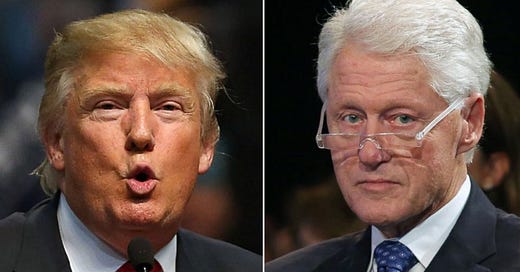Many Republicans are trying to use a ruling made by District Judge Amy Berman Jackson in a 2012 case involving Former President Bill Clinton's audio recordings in order to defend Trump's alleged mishandling of government documents.
In this article, I will explain why the Clinton case doesn't apply to what Donald Trump did and why it doesn't govern the actions that the DOJ can take.
Bill Clinton's Sock Drawer Audio Recordings
During President Bill Clinton's time in office, he met dozens of times with historian Taylor Branch. Clinton recorded nearly 80 different sessions between the two of them, where he discussed his personal life as well as his life as president.
Upon leaving office in 2001, Clinton took these audio recordings with him that he had previously stored in his sock drawer in the White House. In 2012, Tom Fitton of Judicial Watch tried to obtain these audio recordings from the Clinton Presidential Library via the National Archives (NARA). Fitton argued that the Presidential Records Act should require these recordings to be maintained for public access by NARA. However, NARA disagreed with that assessment and agreed with Bill Clinton that they fell into the category of "personal records."
Judge Amy Berman Jackson ruled against the plaintiff, Judicial Watch, and in favor of the defendant, NARA. Her ruling essentially concluded that the President is the individual who gets to choose which records he wants to remove the "presidential records" label from and designate as "personal records." She also ruled that since NARA had no desire to obtain the documents, the courts couldn't force them to do so.
The Judge stated: "The Court has serious doubts about whether the former President's retention of the audiotapes as personal is a matter that is subject to judicial review. But the Court need not decide this question because whether judicial review is available or not, the relief that the plaintiff seeks—that the Archivist assume 'custody and control' of the audiotapes—is not available under the PRA."
While there is a procedure in the Presidential Records Act that allows NARA to request the Attorney General to attempt to recover the documents, Jackson said, "The statute does not mandate that NARA invoke this enforcement scheme but rather vests complete discretion with the agency to utilize that mechanism."
In the end, Judicial Watch was unable to gain access to the recordings because they remained "personal records" of Bill Clinton.
How This Applies to the Trump Case
Republicans like Tom Fitton and others are quick to use this ruling by Judge Jackson to defend Donald Trump's actions. We've seen Donald Trump and many other prominent Republicans jump all over this ruling in defense of Trump. However, it does not seem to apply.
While one could argue that Donald Trump had the right to designate which of his records were "personal records" instead of "Presidential Records," that would only prevent the media from accessing them. "Presidential Records" become publicly available and would be maintained by NARA, accessible to the public via the Trump Presidential Library. "Personal records," on the other hand, would remain private to Trump, just like any American citizen's records are private to them.
For example, if I write a diary or draw up plans to build a treehouse in my yard, those are my "personal" documents. No media outlet would have the right to obtain them without my permission. This also applies to a former president's records. If they are deemed "personal," media outlets and groups like Judicial Watch would have no right to access them without the former president's permission.
The part of the debate that many Republicans are completely missing, however, is that personal records are not off-limits from federal criminal investigations, subpoenas or search warrants.
If the diary I wrote as a normal US citizen outlined a crime I had committed, the DOJ could subpoena me for it. It could be used in a court of law to show evidence of my mindset or of wrongdoing.
The same applies to a former president's personal records. If the government believes that those records are part of a crime or have evidence of a crime in them, or even if they believe that those records are their own, and not his, they should have every right to use our court systems to obtain them via subpoena and/or search warrant. However, just like the media wouldn't be able to obtain my personal diary, they also could not obtain the documents that a former president deems personal.
The DOJ subpoenaed Trump for "classified documents," and then obtained a search warrant for more of these documents. A judge signed off on the search warrant, deeming it legally obtained. The government has an absolute interest in protecting our national security and recouping documents that belong to them. Even if these documents were deemed "personal" by Trump, that doesn't preclude the US government from requesting them via legal court procedures, just like they could if they believed Bill Clinton's audio recordings had evidence of a crime on them.
Feel free to post your thoughts.




